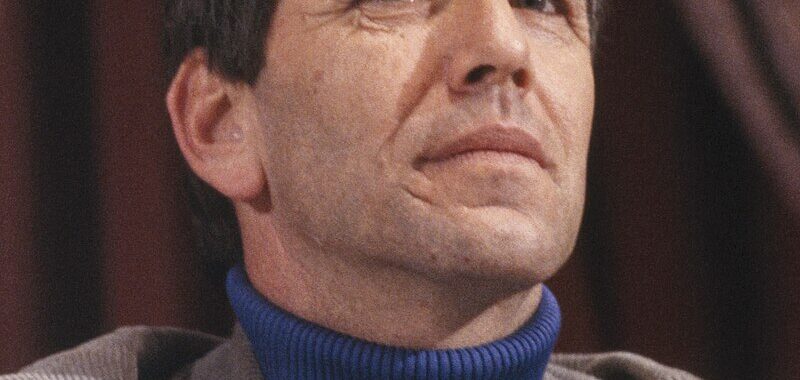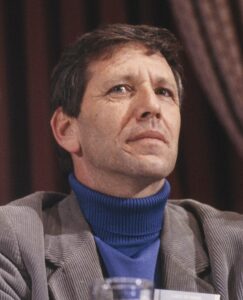By Ranen Omer-Sherman
Guest Columnist
Ever since becoming a citizen in Israel in 1975 where I helped establish a desert kibbutz and served in a combat unit, Amos Oz, one of Israel’s greatest writers and voices of conscience, has rarely been far from my mind. This past year I published the edited volume Amos Oz: The Legacy of A Writer in Israel and Beyond, in which 18 scholars from Israel and around the world offer gripping analyses of his urgent and profoundly universal works about political and romantic dreamers, whose heartfelt struggles with both their own human frailties and those of the state offer profound distillations of the Israeli spirit. Oz died of cancer back in 2018, yet during these terrible post-October 7 days, his thoughts about Israelis, Palestinians, and coexistence seem more relevant than ever.
Oz liked to describe himself as “a peacenik, not a pacifist. Pacifists turn the other cheek because they think that war is the worst thing in the world. I don’t turn the other cheek, because for me not war but aggression is the worst thing in the world. And aggression must sometimes be defeated by force.”
Apropos of that philosophy, when the Israel Defense Forces last invaded Gaza during Operation Protective Edge in 2014, Oz responded to a German interviewer with two questions. First: “What would you do if your neighbor across the street sits down on the balcony, puts his little boy on his lap and starts shooting machine gun fire into your nursery?’ Second: ‘What would you do if your neighbor across the street digs a tunnel from his nursery to your nursery in order to blow up your home or in order to kidnap your family?” At the time, Oz supported Israel’s response to the missiles fired by Hamas, but only in the form of a “limited military response and not unlimited military response. Destroy the tunnels wherever they come from, and try to hit strictly Hamas targets and no other targets,” he cautioned. If Israel exceeded that level of force, there would be “no way in the world to avoid civilian casualties among the Palestinians.” He concluded that a more sustained military intervention in Gaza would only result in “a lose-lose-situation. The more Israeli casualties, the better it is for Hamas. The more Palestinian civilian casualties, the better it is for Hamas.”
So what might Oz say of our current tragic impasse? I have no doubt that even now he would steadfastly advocate for the path he insisted was the only genuine future for both Israelis and the Palestinians, as he said late in life: “My suggestion is to approach Abu Mazen (moniker of Mahmoud Abbas, president of the Palestinian Authority) and vigorously pursue renewed negotiations for “a two-state-solution and coexistence between Israel and the West Bank. When Ramallah and Nablus on the West Bank live on in prosperity and freedom, I believe that the people in Gaza will sooner or later do to Hamas what the people of Romania did to Ceausescu.”
One of Oz’s three surviving children is the historian Fania Oz-Salzberger, who like her father, identifies herself as a proud member of the moderate Israeli left and who shares his vision of an Israel with equal rights for Jewish and Arab citizens. Like many other Israelis she has been scarred by the horrors of the October7 massacre and recognizes the need for a military response. But Oz-Salzberger is also agonized by the deaths of many innocents, including an appalling number of children. In a recent op-ed published in The New Statesman, she expresses great pride in “the triumph of Israel’s civil society. The same citizens who protested on behalf of Israeli democracy turned overnight into a volunteer-based emergency force on October 7. Pro-democracy organizations were the first respondents to the victims, their families, and the evacuees.” By way of contrast, she sharply condemns “Netanyahu’s clownish ministers and their dismal political appointees who are unequal to the task.” For those who find themselves in despair at this time, Oz-Salzberger believes that tremendous numbers of Israelis are eager to repudiate the extremists who have led Israel to disaster and are drawn to the center and moderate left parties. While some may still wish to see a one-state solution, Oz-Salzberger (like her father) insists that in the aftermath of so much horrific violence, the one-state solution is now effectively dead: “Neither in this generation nor in the next will Gazans and Israelis become fellow citizens. A secure and democratic Israel next to a reasonably stable Palestine, governed by the Palestinian Authority or its reliable heir, remains our best hope.” Fortunately, the current U.S. administration agrees: “In our view, it has to be a two-state solution”, President Joe Biden stated on Oct. 25, underscoring America’s likely foreign policy when Israeli operations in Gaza are over: “And that means a concentrated effort for all the parties to put us on a path toward peace.”
That urgent effort is essential for the lives of Israelis and Palestinians alike. Compromise is never easy, but peace depends on it. Here too, it is worth remembering one of Amos Oz’s most powerful declarations about the Israeli-Palestinian conflict:
“My definition of a tragedy is a clash between right and right. And in this respect, the Israeli-Palestinian conflict has been a tragedy, a clash between one very powerful, very convincing, very painful claim over this land and another no less powerful, no less convincing claim. Now, such a clash between right claims can be revolved in one of two manners. There’s the Shakespeare tradition of resolving a tragedy with the stage hewed with dead bodies…But there is also the Chekov tradition. In the conclusion of a tragedy by Chekov, everyone is disappointed, disillusioned, embittered, heartbroken, but alive. And my colleagues and I have been working…not to find the sentimental happy ending, a brotherly love, a sudden honeymoon to the Israeli-Palestinian tragedy, but a Chekovian ending, which means clenched teeth compromise.” The future we all yearn for will clearly depend on the bravery and wisdom of both sides to achieve that “clenched teeth compromise.”
Ranen Omer-Sherman holds the JHF Endowed Chair of Jewish Studies at the University of Louisville




